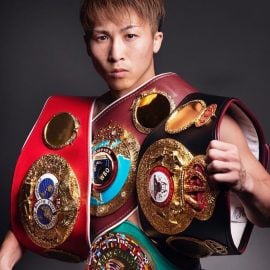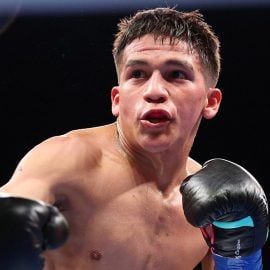Greatest Hits: Michael Moorer
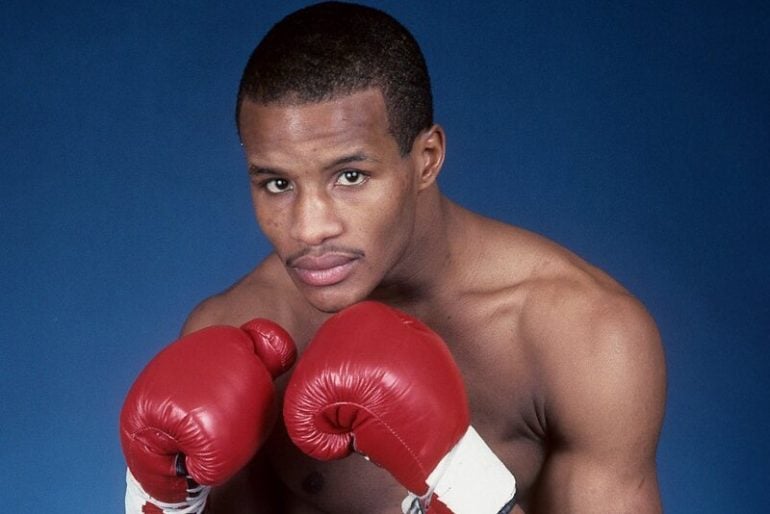
Editor’s Note: This feature originally appeared in the May 2020 issue of The Ring, which is available at The Ring Shop.
AFTER HOLDING A TITLE AT 175 POUNDS, MICHAEL MOORER STEPPED UP TO HEAVYWEIGHT AND BECAME THE FIRST-EVER SOUTHPAW CHAMPION
Michael Moorer fought for respect at the legendary Kronk Gym in Detroit long before he was known to boxing fans worldwide as one of the top heavyweights of the 1990s.
The second-oldest of six children to a single mother, he was born in Brooklyn, New York, on November 12, 1967.
“I left Brooklyn at a young age,” Moorer told The Ring. “I grew up in a small town right outside Pittsburgh, called Monessen. It was a steel-mill town, a heavy-populated town that has since diminished, but there was a lot of hardworking steel workers there.”
One such steel-mill worker was Moorer’s grandfather, a positive male influence on him during his formative years. When Moorer was 10 years old, he helped his grandfather in the garden, which turned out to be an unlikely road to boxing.
“I noticed after I was finished working he would always be gone,” recalled Moorer. “After a while, I picked up on him leaving at a certain time. So he was leaving one day and I was finished and he didn’t know, and I said, ‘Grandad, can I go with you?’ He said, ‘Oh no, boy, you’ve got to finish work.’ I said, ‘I’m done.’ He looked around and said, ‘Come on boy.’ So he took me.
“As we walked in the gym for the first time, I didn’t know my grandfather was a trainer. I saw some guys sparring and I sat down and watched for about 15 minutes, and I jumped up and walked over to the heavy bag and just started punching it. My grandfather had said he’d heard thumps. And, as they say, the rest is history. After that day, I was a regular at the Charleroi Athletic Club.”
Moorer’s grandfather, Henry Smith, had won the New York Golden Gloves championships in 1953 and had sparred with the legendary Archie Moore.
 Moorer was a talented football player in high school, during which time he boxed as an amateur. He found his boxing stride between Olympic cycles, and in 1985 he was the runner-up to Tim Littles at the American Boxing Federation tournament. The following year, he won a national title and a bronze medal at the inaugural Goodwill Games in Moscow. Moorer finished his amateur career with a 48-16 record.
Moorer was a talented football player in high school, during which time he boxed as an amateur. He found his boxing stride between Olympic cycles, and in 1985 he was the runner-up to Tim Littles at the American Boxing Federation tournament. The following year, he won a national title and a bronze medal at the inaugural Goodwill Games in Moscow. Moorer finished his amateur career with a 48-16 record.
That got the attention of Alex Shear, who was the amateur boxing coach for Kronk, and Moorer signed a professional contract with Emanuel Steward. Fighting as a light heavyweight, he made his debut in March 1988.
“I knew I was good, but knowing the magnitude of where I was and what I was doing, I had no clue. That was work for me,” he said. “Being around Thomas Hearns, Gerald McClellan, Hilmer Kenty – all them guys – it was fascinating. Those are my teammates. I had to establish myself, because I was the new guy.”
It didn’t take the young southpaw long. He kept an active schedule, boxing once a month, winning his first 11 bouts inside the distance. Nobody went past the fourth round with him. In December 1988, Steward was convinced of his protege’s talent enough to match Moorer against the more experienced Ramzi Hassan for the inaugural WBO 175-pound title.
Hassan was stopped in five rounds. Moorer retained the title nine times over the next two years.
There was always talk about unification bouts with Prince Charles Williams and Virgil Hill, but no one wanted to fight Moorer; he was a southpaw and a dangerous puncher.
The battle with making weight intensified, and the decision was taken to bypass the unfashionable cruiserweight division (190-pound limit at the time) and go straight to heavyweight.
READ: BEST I FACED — MICHAEL MOORER
“At first, I never struggled. But after a while, I was maturing into a man and my body was growing rapidly,” he explained. “I used to walk around at 206 pounds, and I used to get to 173. I wouldn’t eat. I couldn’t eat. I had to work out all the time and lose weight.
“Back then, Emanuel had us at his house. I lived across the street, but I always stayed at his house for training camp. Thomas Hearns would be there, Gerald McClellan would be there, and we’d eat our breakfast. I would have a boiled egg, that’s it, and I’d be so angry. I had that chip on my shoulder because I couldn’t eat. I wanted to fight.
“After so long, I fought a guy, Danny Stonewalker, at the Civic Arena, Pittsburgh – that was my last fight (at 175 pounds). I said, ‘I can’t make weight. I’m not going to make weight anymore.’ I told Emanuel, ‘I don’t want to lose weight anymore. From here on, I’m going to fight wherever I want.’
“He said, ‘Oh, man, you’ve got to go to heavyweight.’ I said, ‘I’ll go to heavyweight, ‘cause I don’t want to lose no more weight.’ He was always honest with me.”
Moorer eased himself into the new division with six wins before meeting dangerous gatekeeper Bert Cooper for the vacant WBO heavyweight title. The two traded knockdowns in a firefight. The younger Moorer stopped Cooper in the fifth round to become the first southpaw heavyweight titleholder. It was the last fight Moorer had with Steward; he went on to train under George Benton and later Teddy Atlas.
Moorer vacated the lesser-known title and went in search of greater riches, which came five wins and two years later, when, as the mandatory challenger, he met universally recognized champ Evander Holyfield for the WBA and IBF titles. He recovered from a second-round knockdown to edge Holyfield by majority decision, but the physical toll of a grueling bout had a lasting effect on his body.
 “I remember going to the hospital just to get checked out,” he said of his career-best win. “I was so tired. My body hurt so bad. People don’t understand as soon as that bell rings for the final round, immediately you just fall apart. You’re hurting from the waist up; you’re torn up. Your body is so sore. You’ve got to rest, take pills, sit in cold baths, heal your body after that. It takes two-and-a-half to three weeks for your body to get back in shape, to come down off that high. Your adrenaline is pumped. I would stay up for at least three, four days, sometimes a week, coming down off the adrenaline high.”
“I remember going to the hospital just to get checked out,” he said of his career-best win. “I was so tired. My body hurt so bad. People don’t understand as soon as that bell rings for the final round, immediately you just fall apart. You’re hurting from the waist up; you’re torn up. Your body is so sore. You’ve got to rest, take pills, sit in cold baths, heal your body after that. It takes two-and-a-half to three weeks for your body to get back in shape, to come down off that high. Your adrenaline is pumped. I would stay up for at least three, four days, sometimes a week, coming down off the adrenaline high.”
When he returned, he met the iconic George Foreman in his first title defense. Moorer, a decided odds and media favorite going into the bout, had the fight in hand until the Golden Oldie landed a picture-perfect right hand to score a sensational knockout.
Moorer was determined to not let that be the lasting memory of him and regained the IBF title from Axel Schulz 18 months later. He made two successful defenses before dropping the belt to Holyfield in a rematch in November 1997.
“Double M” retired and returned before finally walking away in 2008. He initially worked as a coach at the Wild Card Boxing Club in Hollywood, California.
Throughout his career, Moorer was known for his surly demeanor.
“I needed that edge because I didn’t know what was out there,” he explained. “I was going into the world blinded, because I didn’t have any guidance. I picked up and kept my mouth shut and did what I had to do. By fighting, I got the respect.”
Moorer feels strongly that fighters are exploited for other peoples’ gain, and he was keen to speak on the subject.
“Boxing does nothing for fighters,” he said. “Fighters are used all the time to sign autographs, take pictures to make publicity for the company we’re doing it for. But what do we get out of it? A couple hundred dollars? Couple thousand, maybe? That’s not cool.”
Moorer, now 52, lives in South Florida. He has four children and stays active working with clients who like to stay in shape. He enjoys watching the Pittsburgh Steelers and is a gun enthusiast.
“I stay in my own lane and mind my own business,” he said of his preference for the quiet life.
Here’s what he had to say about six of his most memorable nights in the ring:
RAMZI HASSAN
December 3, 1988, Brook Park, Ohio • Titles: vacant WBO light heavyweight
“That was my 12th pro fight. Emanuel knew the type of fighter that I was, and he knew I could go in there and do what I had to do. Ramzi was considered a tough guy, but I knew my ability because I was coming from the Kronk Gym. I’d had probably 10 fights under my belt maybe equal to 10 rounds, but I got all my rounds in the gym. Because in the gym, fights were always harder because they were trying to make a name for themselves, but I had to make a name for myself. I went in there and did what I had to do. The thing is, when you’re young like that, you don’t anticipate (winning a world title). Your mind isn’t thinking that far ahead. You just want to be the best you can possibly be. I never thought I was going to be a world champion. I just knew how to fight, and I liked to fight. I would always get better. So did the reward as you got better, and rewards came with championship belts and things like that.”
Result: Moorer TKO 5
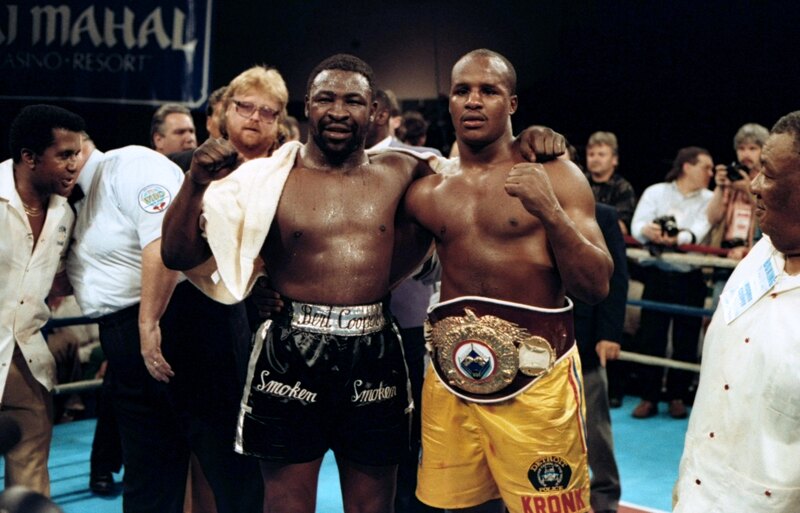
Moorer poses with Bert Cooper after their fight. Photo by: The Ring Magazine/ Getty Images
BERT COOPER
May 15, 1992, Trump Taj Mahal, Atlantic City, New Jersey • Titles: vacant WBO heavyweight
“Ray Mercer was supposed to fight me, but he didn’t want to fight, so I fought for the vacant title with Bert. Bert came to fight. When I fought Bert, him and I just went at it. He hurt me. I was down (twice), but it’s the heart of a champion to get up and fight. He was a guy that always came to fight, so I knew I was going to have a tough fight. But Emanuel knew what he had. He might have got scared when he saw me get knocked down, but then he said, ‘Well, now it’s time to see… let’s see what you’ve got.’ When you go down, people think that’s the end, and some people in their mind are beaten because they go down. They think the fight’s over; they think they’re beaten, and the guy has an advantage over them. It doesn’t work that way with me. Now it’s time to fight. When I go down, ‘Oh, this motherfucker hit me like that? Now it’s time to fight.’ I had to break him down, and I think being a southpaw, I had an advantage as well. I think I always had the advantage being a southpaw, because the jab is coming in from a totally different angle. The WBO wasn’t that recognized back then. I gave it up because back then, Evander Holyfield had the WBA and IBF titles. So in order for me to fight for those titles, I had to vacate.”
Result: Moorer TKO 5
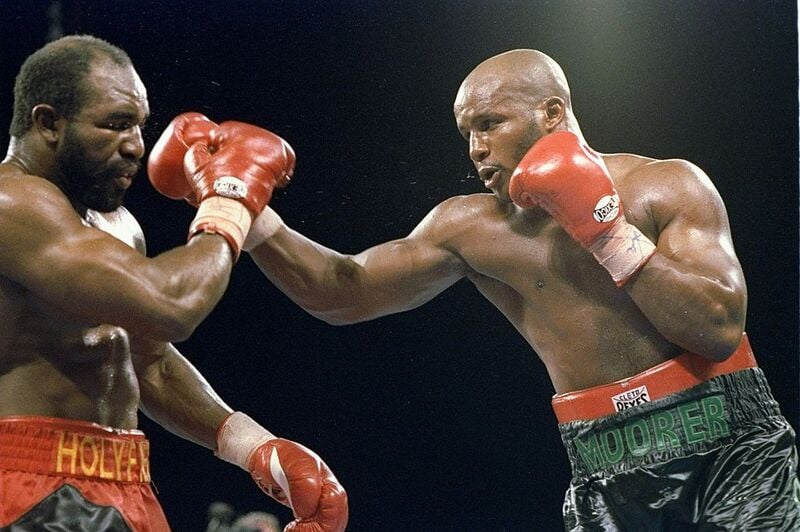
Moorer and Evander Holyfield in their first bout. Photo by Holly Stein/ Allsport
EVANDER HOLYFIELD
April 22, 1994, Caesars Palace, Las Vegas • Titles: IBF/WBA heavyweight
“They were all big fights – it’s just this was for the title. I prepared right; I did everything the right way, and everything was good. I knew I could win that fight. I was confident. I knew I was fighting a guy that was always going to be 100 percent at all times. What I had to do was go out there and establish, dictate and overcome, and I became the champ. I went in there and did what I had to do. The second round, when I got knocked down, I wasn’t hurt. It was a flash knockdown, and I got back into the groove of things. I’m one of very few to win the light heavyweight and heavyweight championships. They tried to throw something in that Evander had a heart attack in the ring, which was nonsense. He just got beat by the better guy that night. Evander is always going to be a good guy. He studies you. I was the man who beat the man who beat the man, so I was the guy. Everyone knew who I was, but they knew who Evander was three times-fold over me. Evander is synonymous with boxing.”
Result: Moorer MD 12

Moorer scores on George Foreman. Photo by The Ring Magazine/ Getty Images
GEORGE FOREMAN
November 5, 1994, MGM Grand, Las Vegas • Titles: IBF/WBA heavyweight
“I had a great training camp in Palm Springs, California. I had great sparring. Everything was fine for this fight. I remember George saying one time we were at a press conference, ‘Take them sunglasses off; let them see your eyes.’ I’m no fool; you wanted to see my eyes. That fight with George, I got careless. That’s it. I was in front. Teddy had always told me, ‘Michael, don’t stand in front of him. He looks old but he hits like a sledgehammer; he always carries that sledgehammer.’ Hey, I got caught. I was beating him and I got caught. That’s part of boxing. I thought I could get up. That punch put 32 stitches in my lip. That was it. He slid it right in there perfectly. I was upset because I let my son down. I wasn’t worried about anyone else, because you win them and lose them. I just didn’t want my son – at the time he was young – to see me hurt and upset. That’s what was important to me. George and I became very good friends. He’s a great man. His family, they’re great people.”
Result: Foreman KO 10
AXEL SCHULZ
June 22, 1996, Westfalen Stadion, Dortmund, Germany • Titles: vacant IBF heavyweight
“Leading up to that fight, I was over there for a while and they had a great team who they sent me that looked out for everything. The only thing I didn’t like was the Autobahn … oomph! They were going fast. I sat in the back and just closed my eyes. Axel Schulz, he had a name; he was a big guy in Dortmund, Germany. Inside that stadium was electrifying that night. The stadium was huge. I felt good. I didn’t feel like I was at a disadvantage. I felt everything was even, on the up and up. It was never on my mind about redemption; it was just about winning the fight. I thought I was more effective in using the jab and throwing combinations, catching him off-balance. I figured I won the fight, but I was in a different country, so you never know. It was a goal back then to win the heavyweight title again, in a different country, and I’m going to do it the way I want to do it. And I could go home and show my son the heavyweight title.”
Result: Moorer SD 12
FRANS BOTHA
November 9, 1996, MGM Grand, Las Vegas • Titles: IBF heavyweight
“I was the type of guy, and people still say to this day, ‘Michael Moorer don’t play.’ I was always serious, because this is my life. This is my job. You don’t play boxing. Francois Botha had a reputation of being a tough guy – he did this, he did that – and then it was my turn to fight him. So he was very confident. I was never a guy who played into peoples’ antics. We were in the face-off after the weigh-in, he kept acting like he was going to throw his right hand, like he was going to knock me out, and everybody was going, ‘Oooh!’ I just looked at him and gave him the middle finger. That was it. I didn’t say two words, I just gave him the middle finger and the whole place erupted. I wanted to punish Francois. I wanted to beat him a little bit. He was a little cocky for me. Don’t do this cocky shit with me. This is boxing. If I win, if I lose, let’s get along. We can talk shit leading up to the fight and during the fight, but let’s be cool, cordial and respect each other. When you don’t respect me, there’s gonna be a problem. I’m going to respect you until you disrespect me. That’s how I see boxing should have been always. I punished him.”
Result: Moorer TKO 12
Questions and/or comments can be sent to Anson at [email protected] and you can follow him on Twitter @AnsonWainwright.







